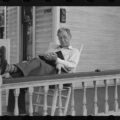We should all be more like Steve Martin

I got the chance recently to see a performance of Steve Martin and Martin Short’s new comedy tour “An Evening You Will Forget For the Rest of Your Life.” And while it’s notable in and of itself that this legendary duo isn’t relying on old material to amuse packed houses every night, it’s even more significant because Steve Martin hasn’t performed in a comedy tour since 1981. He simply hadn’t felt the need to for a long time.
As Martin notes in his memoir Born Standing Up, after he rose to meteoric fame, he saw he had an opportunity to do more with his life than stand-up: “It was about coming to the end of the road. There was no way to live on in that persona. I had to take that fabulous luck of not being remembered as that, exclusively.” Martin is now almost equally renowned as a writer, musician, actor, art critic, and Broadway show producer as he is for his comedy work. And it shows—each night of the current tour, he garners almost more applause for his banjo playing with the Steep Canyon Rangers than for his witty one-liners.
Many comedians have pursued personally meaningful work later in their lives. Martin’s partner-in-crime Short, for example, has become an ally for cancer research. Betty White supports animal rights. Jon Stewart runs a farm sanctuary with his wife. Al Franken is a member of the Senate. Others have chosen more artistic endeavors: Jim Carrey and Martin Mull paint. Nick Offerman is an accomplished woodworker. A few prefer to keep moving—Jerry Seinfeld and Jay Leno both have shows where they drive around in classic cars. Others have shifted into business. Dan Aykroyd recently retired again—this time from his popular blues radio show—but still sells high-end vodka and holds a stake in the House of Blues clubs. Drew Carey owns part of the Seattle Sounders soccer team. And, then, of course, there’s Bill Murray, who maintains his legendary folk status by crashing weddings, singing to packed audiences at karaoke bars, and playing a lot of golf.
For those of us in the audience, watching longtime friends like Martin and Short share their stories, it’s hard not to daydream about switching places with them. Who hasn’t fantasized about leaving their humdrum nine-to-five job for something more satisfying? However, most of us can’t act on that impulse. After all, most of these passions are not clearly designed to be big career enhancers or money-makers. These comics paint or drive or whittle or play music because it’s fulfilling. And, if an audience shows up, great—they’re happy to share. As Martin quipped while pulling out his banjo, the best way to get people to appreciate banjo music is to write your own songs and, of course, already be famous.
How is it that these comedians seem to evolve so effortlessly into these second (or third) successful acts? In one way, there’s an easy answer. Someone like Jerry Seinfeld makes the Top 10 on America’s Richest Celebrities list each year, so he probably feels freer than the rest of us to explore new ideas. But he’s still a sharp contrast to many other rich celebrities, who desperately re-launch their film franchises and grasp at new schemes to stay relevant. Comedians like Martin, meanwhile, make meaning look easy. They focus only on their interests and look into the future, knowing that others will likely appreciate their efforts.
We also need to keep in mind how they got to this relaxed Zen-like awareness of who they are and what they want. The comedian David Steinberg once said in an interview with the New York Times: “I used to have a theory that if you have a great childhood, great marriage and enough money, you are going to make a lousy stand-up comedian. […] The thing about stand-ups is you can’t really get good unless you’re failing in front of a large number of people. That makes stand-up comedy unique: you need a tremendous amount of reserve within you to take the rejection from the audience, and without it, you can’t do anything.”
After all, their previous lives as comics wouldn’t be for everyone: long, lonely stretches on the road before late nights with fickle audiences. Harsh critics. Personal struggles. Many of these second-act comics overcame more than the usual set of hardships: rough upbringings, bad marriages, sickness, lack of acceptance, abuse, addictions, scandals, and loss. Some of them, in turn, bravely held up these very personal struggles to an audience, asking strangers to laugh along with them at the human condition. The philosopher Alain de Botton observes in his book, The Pleasures and Sorrow of Work, “It isn’t normal to know what we want. It is a rare and difficult psychological achievement.” I doubt many audience members would willingly want to face these demons just to achieve some contentment later in life.
When asked about this recent tour, Martin told a San Diego newspaper, “This is my work now. Marty and I both feel lucky to have found this thing, which is work we enjoy doing, that really seems to be going over well.”
Maybe that luck shouldn’t be attributed to a beneficent universe. Getting a laugh is rewarding for both the audience and the performer. To quote de Botton again: “When does a job feel meaningful? Whenever it allows us to generate delight or reduce suffering in others. Though we are often taught to think of ourselves as inherently selfish, the longing to act meaningfully in our work seems just as stubborn a part of our make-up as our appetite for status or money.“
Comedy provided the opportunity and the means to do meaningful work, to making people laugh and forget their own lives, if only for a short while.Perhaps, after years of giving of themselves through these acts and jokes and observations, it only makes sense that comedians turn their attentions inward to re-till their own emotional soil, finding ways to keep themselves satisfied. And for someone like Martin, that also leads them back to comedy but with more of an awareness of how to make it fun for everyone.
And, that’s what the audience can learn from their new roles. Rather than asking how we can mimic their path to bliss, maybe the better question is this—how can we find ways to share meaning with others, no matter how unlikely a form it may be?
About Maria Judnick
Maria Judnick is a writer and educator living in the San Francisco Bay Area. She writes for many local publications and has coordinated six National Endowment for the Humanities summer institutes for teachers. She is finishing her first novel.





